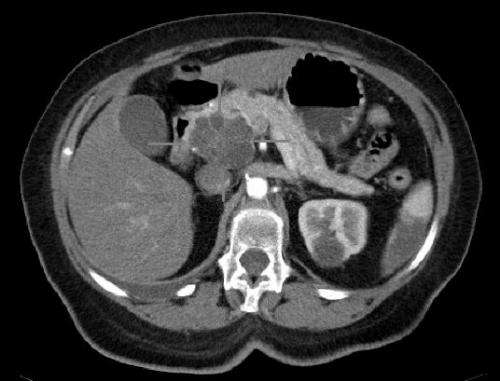New era in precision medicine for pancreatic cancer

The development of new treatments for pancreatic cancer is set to be transformed by a network of clinical trials, aiming to find the right trial for the right patient, after a £10 million investment from Cancer Research UK.
The investment will support the PRECISION Panc project which aims to develop personalised treatments for pancreatic cancer patients, improving the options and outcomes for a disease where survival rates have remained stubbornly low.
Professor Andrew Biankin at the University of Glasgow, who has pioneered the project along with researchers across the UK, aims to speed up recruitment and enrolment of pancreatic cancer patients to clinical trials that are right for the individual patient.
The researchers will use the molecular profile of each individual cancer to offer patients and their doctor a menu of trials that might benefit them.
The first wave of research will establish the best way to collect and profile patient tissue samples. Each patient will have up to five samples taken from their tumour at diagnosis for analysis at the University of Glasgow.
The results will guide clinical trial options in the future.
The three trials planned as part of this initiative will recruit a total of 658 patients from a number of centres across the UK - with the scope to add more trials in the future. Patients may also be helped onto suitable clinical trials that are already up and running.
Professor Andrew Biankin, a Cancer Research UK pancreatic cancer expert at the University of Glasgow, said: "PRECISION Panc aims to transform how we treat pancreatic cancer by matching the right treatment to the right patient.
"Because the disease is so aggressive, patients may receive no treatment at all or if they are given an option it will be for just one line of treatment, so it's essential that the most suitable treatment is identified quickly. It's important we offer all patients the opportunity to be part of research alongside their standard care."
The programme will ensure discoveries from the lab rapidly reach patients, and that data from clinical trials feed back into research of the disease.
Cancer Research UK's investment will support two of the three clinical trials, preclinical work, assay development, biomarker work and the huge amount of molecular sequencing.
The charity's funding will also provide overarching support though project management, funding staff, and a steering committee.
Professor Biankin added: "PRECISION Panc has been developed over the course of three years through the unwavering commitment of pancreatic clinicians and researchers who see that the patients deserve much more than is currently available to them. I'm fully committed to this project and I believe we're on the cusp of making some incredible advances which will provide therapeutic options to help people affected by this terrible disease.
"Without Cancer Research UK and their vision for cancer precision medicine, and the commitment of the other stakeholders, we couldn't get PRECISION Panc up and running."
Dr Ian Walker, Cancer Research UK's director of clinical research, said: "This ambitious project marks a new era for pancreatic cancer. Little progress has been made in outcomes for pancreatic cancer patients over the last 40 years, and we believe that PRECISION Panc will reshape how we approach treatment development.
"Cancer Research UK is determined to streamline research, to find the right clinical trial for all pancreatic cancer patients and to ensure laboratory discoveries have patient benefit."















